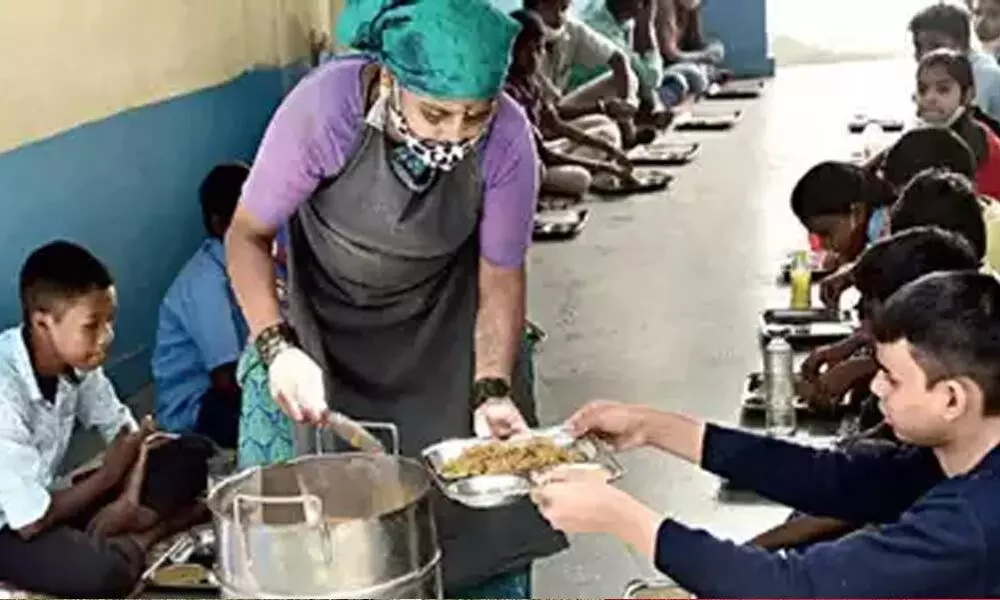Live
- Make all arrangements for smooth conduct of Group-2 exams
- CP congratulates chess champs
- Stage set for children’s science exhibition
- ‘Generation Green’ initiative to drive e-waste awareness
- Mysore royal family to get Rs 3,000 crore compensation for Palace Grounds
- Suspend officers who caned Panchamasali protesters: Bommai
- Unique move by student reaches over 1,500 in 8 countries
- Thudi takes up key issues with Uttam
- IRCTC to run ‘Maha Kumbh Punya Kshetra Yatra’
- BRS leader denies earthquake’s effect on Medigadda project
Just In
Doctors In Karnataka Claimed As It Is Safe To Send Children To Schools

Hans News Service | 22 Oct 2021 6:15 PM IST

x
Resumption of the midday meal scheme was greeted with unbridled joy on school campuses in Bengaluru on Thursday. (Photo/timesofindia)
Highlights
- The state government's decision allowing schools to reopen in the first five classes on October 25
- Parents are being counseled by doctors and told there is no cause for concern.
In the days following the state government's decision allowing schools to reopen in the first five classes on October 25, pediatricians have been inundated with safety-related queries from parents anxious about sending children back to school. Parents are being counseled by doctors and told there is no cause for concern.
pediatricians stated that parents worry about sending their children to school, even though children are being taken to other locations. Children remain fearful of the virus. In this topic, they discuss how online learning does not solve the problem of loss of learning in children.
During her tenure as chairman of the executive committee of the India Academy of Paediatrics (IAP), Dr. Preeti Galagali said she received concerns from 75% of parents regarding sending their children to school. As a broadcaster, he had created a group to spread the word among parents regarding the importance of sending their children to school. It appears that no older children have reported symptoms of colds or coughs since schools reopened for the older students. Infections of the respiratory system are more common among smaller children, whose schools have not yet opened.
Parental outreach is encouraged by Dr. Galagali, who encourages parents to visit schools in person to see the precautions in place there. As a result, schoolchildren are aware that they should wear masks; and the schools are equally concerned about following Covidappropriate Behavior [CAB].
Dr. Sudarshan states that during a visit to a school this past week, a state government representative said the state government had considered every aspect before allowing schools to open. The consent of parents is necessary for regular classes to take place. Testing is routinely conducted on children. In the present day, children in schools have a positivity rate of just 0.1%. There have been very few cases of Covid Wave-3 according to top state officials on the state's High-Level Expert Committee for Prevention and Management of Covid Wave-3. The vast majority of adults who live in the United States have either taken the vaccine or contracted the disease.
There is a low likelihood of transmission among adults according to Chinnappa said. The concern is transmission from child to child, but studies in the West indicate that these chances are also high extremely low. Even if children get infected, 95% of them will have no major symptoms other than mild cold and cough. Consequently, children should be encouraged to attend school. Dr Chinnappa said physical distance should be maintained in schools whenever possible and as many activities as possible should be offered.
During her presentation, Dr. Chinnappa said it is important for schools to maintain a healthy distance between students and conduct as many outdoor activities as possible. Testing should be done frequently to ensure the cases do not go undetected. He advised random testing. Intensivist Dr. Aditi Gandhi, pediatrician at Columbia Asia Hospital, Yeshwantpur, says there should be no reservations about sending children older than five to school.
Her understanding of the benefits of CAB has taken almost a year. She expressed the opinion that it would be better to call it 'respiratory appropriate behavior' since it would protect people from respiratory infections of any kind.
The benefits of following CAB should be reassuring to us. When people touch each other's faces and eat food near one another, they spread the virus. Some schools allow students to bring their own lunch. Dr Chandrashekar said schools should ensure there is a two-foot gap between children eating in schools and the area should be well-ventilated. In order to ensure the safety of children, schools and children must adhere to these safety norms. Nonetheless, Dr. Chandrashekar expressed concern about the matter.
Preschools should open as respiratory infections among younger children are high. Currently, the government has not made any decisions regarding preschool opening.

Next Story
More Stories
ADVERTISEMENT
© 2024 Hyderabad Media House Limited/The Hans India. All rights reserved. Powered by hocalwire.com






